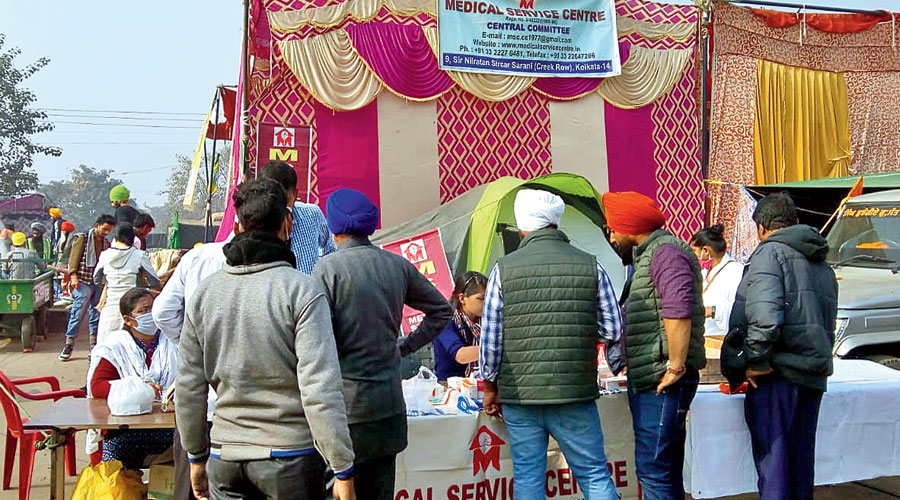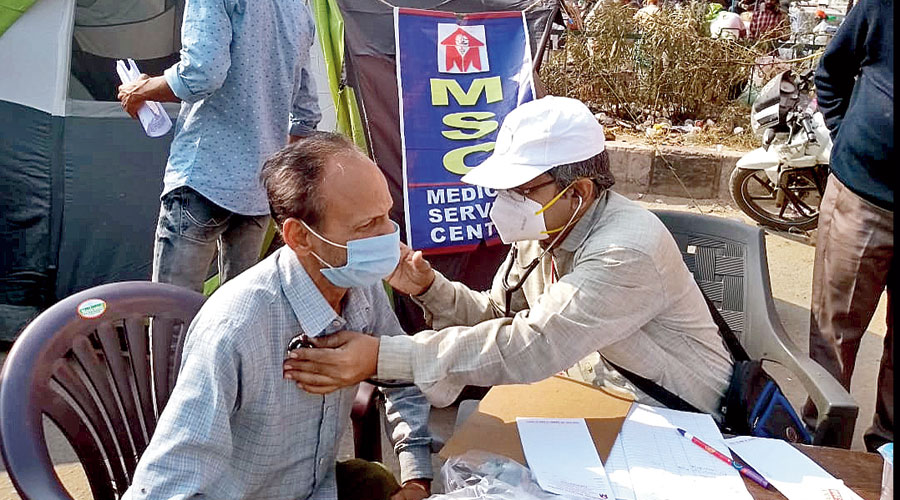Ten December nights in a tent. Twelve hours of work a day from a makeshift roadside camp. Meals at langars.
The farmers’ agitation on Delhi’s borders features a team of Calcuttans. Its members carry stethoscopes, not placards.
Anshuman Mitra, Mridul Sarkar and Soumyadip Ray, all Calcutta-based doctors and part of the non-profit Medical Service Centre, arrived at the Singhu border on December 2 evening to provide the protesters with medical aid.
They were joined by three nurses and four volunteers, all members of their pan-India organisation, from Madhya Pradesh, Uttarakhand and Delhi.
Every day their camp opened around 9.30am and continued till sundown, treating people for common cold, allergies, upper respiratory tract infections, eye and skin infections and chronic conditions like hypertension and diabetes.

Protesters at the Singhu border line up at the camp run by the doctors from Calcutta. Picture by Mridul Sarkar
After that, the team ran “mobile camps” looking for people in need of medical help. They slept in the portable tent but had to respond to emergency calls through the night.
“The agitators welcomed us with open arms. They were very happy that a team from Calcutta had come to stand by their side,” said Sarkar, 43, who returned to Calcutta on Saturday.
He added: “Delhi’s harsh winter, smog and pollution were behind the ailments of many. Some others needed treatment after facing water cannons, police batons and barricades.”
His colleagues are still in Singhu. A couple of other doctors from the non-profit’s Calcutta arm have joined them.
Sarkar, chief medical officer (paediatrics) with a private hospital in Calcutta, said the protesters’ resolve had left him amazed.
When a 72-year-old woman reported at the medical camp with breathing problems, Sarkar had cited her age to suggest she return home.
“I shall die here if I have to but will not return unless the farm laws are repealed,” Sarkar remembers her telling him.
When another member of the medical team asked an elderly protester on a tractor how long he would be able to continue the vigil, the farmer held out his right palm.
“This hand has steered tractors for decades. Don’t underestimate it. We are here for the long haul,” he said.
Thousands of tractor trailers are parked along a stretch of highway that extends more than 12km from the Singhu border into Haryana. They have been turned into temporary homes with tarpaulin sheets.
Sarkar and his colleagues had brought a portable tent and sleeping bags with them. The camp was formally inaugurated on December 3 by Sadbir Singh, Punjab state secretary of the All India Kisan Sangharsh Coordination Committee, and other farmer leaders.
The non-profit had in the past conducted medical camps after natural disasters like the 1999 Odisha super-cyclone, 2004 tsunami and the 2013 Uttarakhand floods. Sarkar had been part of a series of camps in South 24-Parganas after Cyclone Amphan struck on May 20.
The atmosphere at the Singhu border was different, he said. The lines in front of the camp kept growing by the day but, unlike the scenes witnessed at OPDs and clinics in Calcutta, none among the visitors was competing for slots or trying to jump the queue.
“Everybody waited patiently. A young visitor made way for an elderly man despite having reached the camp earlier. The sense of common purpose and camaraderie was evident,” Sarkar said.
Many of the protesters were patients of chronic hypertension, heart disease or obstructive lung disease and needed medicines every day. When they and Sarkar’s camp ran out of stocks, visiting doctors and medical students volunteering at the protest venue chipped in by donating medicines.
A team of interns from a medical college in Amritsar handed over a variety of medicines to Sarkar’s camp.
Every other day, young volunteers would come to Singhu carrying food, ranging from pizzas to bread pakoras.
But Sarkar’s team ate mostly at the community kitchens or langars set up by the farmers. In between the long lines of tractor trailers, the agitating farmers and their supporters have set up more than 200 large langars and makeshift bathing and toilet facilities.
The menu was usually rice, rotis, dal and sabzi with the occasional dessert. “We could walk into any langar and eat, no questions asked,” Sarkar said.











